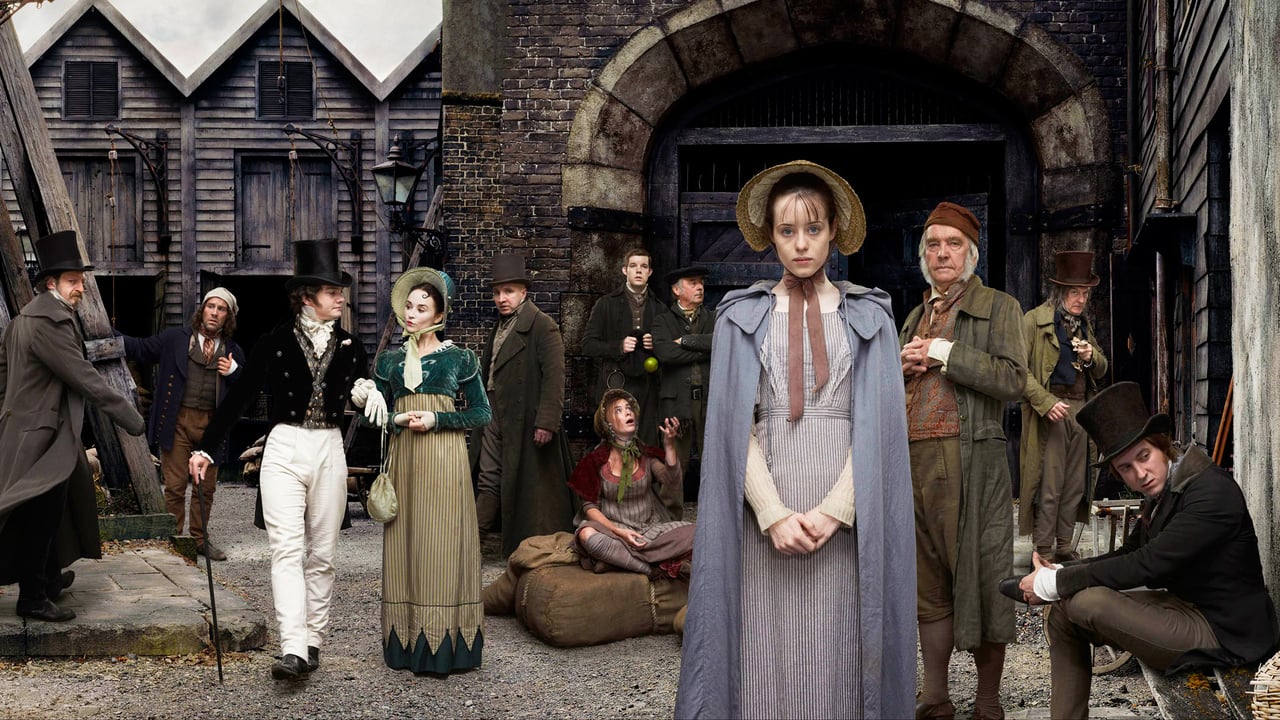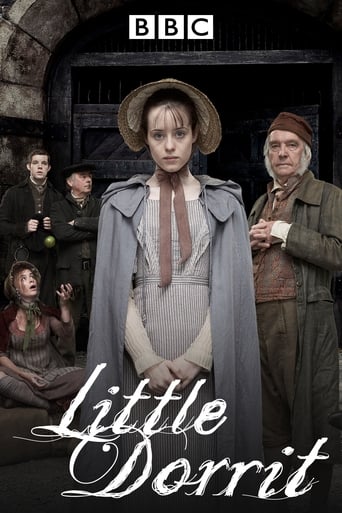

This Movie Can Only Be Described With One Word.
... View MoreBetter Late Then Never
... View MoreA clunky actioner with a handful of cool moments.
... View MoreThrough painfully honest and emotional moments, the movie becomes irresistibly relatable
... View MoreI am a great fan of period dramas in general, and especially of the Andrew Davies BBC adaptations. Of all the movies done of Pride and Prejudice, none come anywhere near the exemplary dramatization done by Mr. Davies.I saw the original 1988? movie of Little Dorrit, and apparently was one of the few who really enjoyed it! I thought the actress Sarah Pickering was appropriately waifish, mysterious, resolute but "minding her humble place," and I have no problem with actresses re-creating characters that are accurately representative of the way women behaved in that time period, and the way Dickens wrote them. The sassiness that 21st century actress often bring Dickens' characters is bothersome because it is simply not an accurate representation. We have to get past our pride to accept that this is just how reality was back then, and if done right, the proper 19th century representation can have something very refreshing and winsome about it. That is why I enjoyed Sarah Pickering's Dorrit.Having said that, Andrew Davies' Little Dorrit was really very good. Claire Foy as Amy was a bit saucy at times for my taste, but overall did an excellent job. The entire production was high-class and visually very attractive.The plot had some unexplainable loose ends, and since I haven't read the book, I'm not sure if it's a fault of the book, or because the movie just ran out of time. For example, Tattiecorem was a big, colorful character, well-developed, at the beginning of the story. By the end of the story, I wondered what had happened to her and what was the purpose of her character being in the story at all. Same with Pet and Henry--after the baby was born, what happened to them?? And I didn't understand the purpose of the Blandois character to the plot in general. He was a frightening, vicious killer at the beginning. By the end he was an annoying, intrusive extortionist but kind of lost the "evil". I can't figure out why Dickens needed a character like that to expose the secret of Mrs. Clennan. It seemed totally unrelated to the rest of the story. Perhaps Mr. Davies just had too many characters to deal with, even with such an epically long program.But none of that detracted from my enjoyment of the movie. It was high quality in every way. I plan to buy the DVD and add it to my collection!
... View MoreLITTLE DORRIT is an excellent British TV version of the Dickens novel, the kind of saga that almost makes David Copperfield's struggles look pale by comparison. Here, the leading characters are mystified by the secrets involving their past and the young man ends up in debtor's prison when he can't pay his creditors. Everything is eventually cleared up, but getting to the end of all the woes is quite a struggle.As usual, all of it has been given magnificent production values, great sets that look as though people really lived there in those times, and fine acting by an ensemble cast of fine British actors. MATTHEW MACFAYDEN and CLAIRE FOY are splendid in the leading roles and ANDY SERKIS does a fine job as the villainous Ragaud.I'm going to have to watch the replay to see the whole story, but what I saw has certainly whetted my appetite for catching the whole story from beginning to end. I can see why this production has been winning so many awards. Fine job.
... View MoreThis BBC adaptation of the Dickens novel has enthralled me from the very beginning, mainly because of the outstanding quality of its performances. Every single character, even minor ones like the insufferably haughty Merdle butler or the paranoid Italian (perhaps with the exception of Maggy who's perfectly manicured fingernails in one close-up blew her otherwise worthy portrayal), has been ideally cast and all the actors are absolutely convincing in their delivery.What made me write this comment, though, was Tom Courtenay's heart-wrenching performance as Mr. Dorrit for which I hope he will receive all the accolades he deserves. His multifaceted Dorrit awed me until the very end and will resonate with me for a long time.What I particularly liked about the series was how we got more than a glimpse of all the characters' 'little lives', people going about their respective businesses, revolving in their little worlds. Even if a scene only touched on a certain character, setting, costumes, and dialogue provided ample information for the viewer to evoke the full picture of this character's life and to imagine how they would go on after the camera had panned away to continue with the main story.On top of that, the great care put into the selection of costumes and locations made Little Dorrit a real feast for the eye, perfectly accompanied by the wonderful score by John Lunn.May this be a 'true Dickens' or not, what it surely is, is Grand TV. And as such, it adds another sparkling jewel to my cherished collection of BBC adaptations.
... View MoreOh, I do love a good period drama I got interested enough after one episode of this to re-read the book for the first time in 10 years, and was impressed by how very dark and cynical Dickens' tone is. The show is well-shot and well made, and does the book justice in almost every way. The only thing which is so far slightly lost is the cynicism: the staggering incompetence and idleness of the Circumlocution Office is meant to be an attack on the whole governmental administration system. Likewise, the inordinate raising up of one person above others on a great balloon of hot air, and the great, national disgrace that was the imprisonment of whole families for debt. The intensity of the satire is missing which is a great shame, since a central part of the story finds its perfect parallel in events unfolding both in this country and elsewhere right now. That was a missed opportunity but I suspect the show wouldn't have attracted such ready funding and promotion if it laid the satire on too thick at the expense of say, the costumes (yawn).The casting is excellent, and it seems almost unfair to single out individuals from the list, including Judy Parfitt's cold Mrs Clennam, Tom Courtenay's vain, haunted Mr Dorrit, Russell Tovey's charmingly emotional young Chivery, Claire Foy's delicate, youthful Amy and Matthew McFadyen's kind-hearted, generous Arthur. Ruth Jones' wondrous recreation of the voluminous Flora is bettered only by Annette Crosbie's frankly terrifying Aunt. (She's how I want to be when I get old!) I'd been disappointed by McFadyen's Mr Darcy in the Joe Wright film "Pride & Prejudice" - it was almost at times as if he had been stuffed, and his looks were somehow lost in the mix. Here all his best attributes are to the fore his eyes, his height, his voice and manner, the excellence of his diction all these create a warm, breathing man out of really quite flimsy material. In the book and even in this dramatisation, Arthur is a rather shadowy presence, on the sidelines while things happen to those around him. Yet his appearance each week is like a beacon, a feeling of warmth, like home. Claire Foy does a really wonderful job as the title character. Dickens' heroines used to drive me mad so tiny and blushing and always so very, irritatingly good, drat them. Foy manages to be all of these things, but to be likable too, and I very much admire her for it. The way she looks at her father half with love, half with pity is spot on. Tom Courtenay is brilliant I can't imagine anyone else being able to bring so much to the character of this foolish, vain, blind Mr Dorritt. I kept missing episodes and having to watch them on the (BBC's excellent i-player) catch up site. Now I've at last seen the final episode I think it's sadly rushed, missing a few voyeuristic opportunities for catching up on some of the minor characters seen in the series. However the scenes between John Chivery, Arthur and Amy are moving and beautifully handled. I will definitely be getting hold of the DVD. This one's a keeper.
... View More